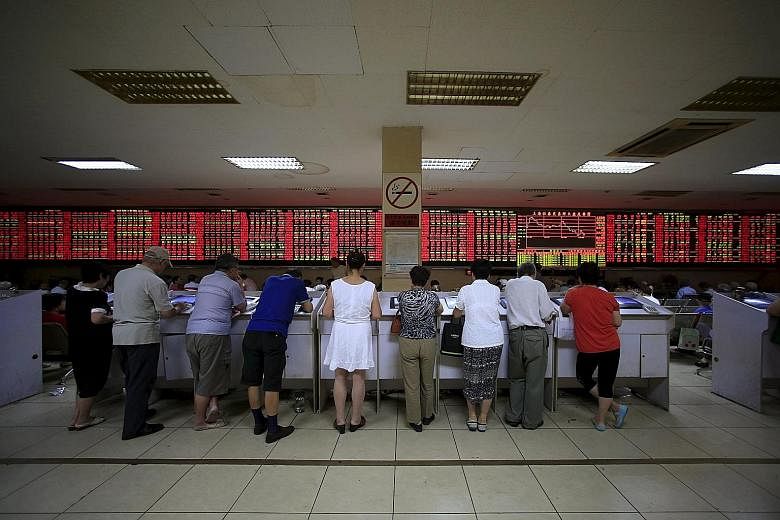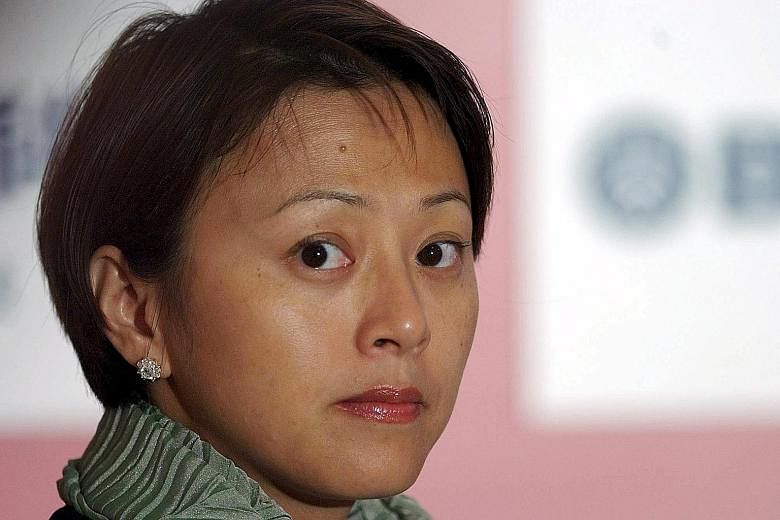BEIJING • The police have been dropping in on investment firms and downloading their transaction records. Senior executives at China's biggest investment bank have been arrested on suspicion of illegal trading. A business journalist has been detained and shown apologising on national television for writing an article that could have hurt the market.
The Communist Party's response to China's months-long stock market crisis has been swift and forceful. In addition to spending as much as US$235 billion (S$332 billion) to buy shares and bolster prices, the authorities have imposed a range of extraordinary restrictions on the sale of stocks - and backed them with the full weight of a security apparatus usually more focused on political dissent than equity trades.
The strategy appears to have succeeded, at least for now, in softening the impact of the Chinese market's biggest rout since the global financial crisis of 2008.
But the new limits on trading and the efforts by the police and regulators to enforce them have unsettled investors at home and abroad who are unsure exactly what types of transactions are being banned or criminalised.
After decades of watching China make slow but steady progress in building Western-style financial markets, many are now asking whether the party is reversing course - and whether Chinese officials are willing to tolerate the sometimes turbulent waves of selling that are inherent to such markets.
"What's happening in China is definitely spooking people," said Ms Dawn Fitzpatrick, chief investment officer of O'Connor hedge fund owned by investment bank UBS. "They've set themselves back a couple of years" in terms of attracting investment, she added.
Anxiety in the industry surged last week after Ms Li Yifei, the prominent China chief of the world's largest publicly traded hedge fund, disappeared and Bloomberg News reported that she had been taken into custody to assist a police inquiry into market volatility. Her employer, the London-based Man Group, did little to dispel fears, declining to comment on her whereabouts.
Ms Li resurfaced on Sunday and denied that she had been detained, saying that she had been in "an industry meeting" and "meditating" at a Taoist retreat. But many in the finance sector are unconvinced.
"There is, generally, a very nervous atmosphere, as people wait to see the outcome of some of these investigations and how deep the rabbit hole goes," said Ms Effie Vasilopoulos, a partner at the Hong Kong office of the Sidley Austin law firm who works with hedge funds that invest in mainland China.
"How wide a net is the government going to cast in terms of looking at foreign firms and their operations - not just onshore, but also offshore as well?"
The authorities are canvassing industry players in several cities, including Beijing and Shanghai.
Police officers under the Chinese Ministry of Public Security specialising in economic crimes have joined agents from the nation's securities regulator on inspections of investment funds and brokerage firms. The authorities are combing through records and questioning transactions that appear to profit from or contribute to a falling market, according to staff of investment firms who, like others who spoke anonymously for fear of reprisals.
Police officers have downloaded extensive trading data and asked fund managers why they sold shares when the market was going down, prompting discussions about basic investment strategy. Officers have bluntly told some fund managers to just stop selling.
While regulators and law enforcement elsewhere in the world routinely meet investment companies to monitor trading for potential abuse and illegal activity, they seldom do so with the aim of steering the direction of the markets.
The government has offered few details about the various investigations, contributing to the atmosphere of uncertainty. Late last month, it announced the arrests of eight executives at state-owned Citic Securities, the country's largest brokerage firm and investment bank, including four members of its senior management, on suspicion of insider trading. At least four other brokerage firms said last month that they were being investigated by regulators for failing to properly identify their clients.
While insider trading is common in China's relatively opaque markets, the investigations also serve the government's short-term goal of discouraging sales and stabilising prices, said Mr Chris Powers, a senior consultant at Z-Ben Advisors, a financial consulting firm in Shanghai. "Is this more about limiting supposed market manipulation, or is it about sending a message to the market as a whole and using these cases as examples?" he asked.
Starting in the middle of last year, China's markets enjoyed a breathtaking rally driven by record levels of margin financing, or borrowing to invest in stocks, and strong signals of government support, including cheery reports on the bull market in official news outlets like People's Daily. But the Shanghai Composite Index has fallen 37 per cent since the sell-off began in June, and the government has intervened directly and repeatedly in an attempt to support prices.
The measures include restrictions on short-selling, or betting that stocks will fall. Regulators in the United States took similar action for a month at the height of the 2008 financial crisis, but the Chinese authorities have been vague about what kinds of transactions have been prohibited and for how long. The police have said they are investigating "malicious" short-selling but have not said what that entails.
While central banks in the US, Europe and Japan have used unconventional monetary policy in recent years to stimulate growth and lift markets, China's intervention has been more direct, with the government ordering brokerage firms to contribute to a bailout fund. In a report this week, analysts at Goldman Sachs estimated that entities directed by the Chinese government have spent about 1.5 trillion yuan, or US$235 billion, buying shares to support the market.
While opening its wallet, the state is also wielding a cudgel. At the end of last month, respected financial news magazine Caijing's journalist Wang Xiaolu was detained by the police and shown on state television apologising for an article suggesting the government might scale back its bailout of the market. Nearly 200 others have been punished in a special police campaign against "spreading rumours", including some detained for discussing the stock market.
Censors have ordered the Chinese news media to avoid any reporting that might result in a market sell-off. With the economy growing at its slowest pace in a quarter-century and the party leadership worried about social unrest, discussion of the markets can draw official scrutiny almost as quickly as political speech.
"Like many other bad ideas, the Chinese have finally adopted the Western practice" of discouraging financial critics and banning short-selling when markets turn down, said prominent American short-seller James Chanos, who has bet on a downturn in China for more than five years. "It has never worked here, and does not appear to be working there, either."
One hedge fund manager based in Hong Kong said that he was cashing out most of the nearly US$500 million he has invested in the mainland because of fears that his money could get tied up by new rules, with no legal recourse.
Though foreign investors are being singled out, only about 1 per cent of China's US$6.4 trillion domestic market value is owned by such investors, according to estimates by UBS.
Ms Anne Stevenson-Yang, co- founder of J Capital Research, which analyses the Chinese economy for investors, said the restrictions on selling had turned the Chinese stock market into "a roach motel for capital". "You can enter," she said, "but if you want to leave, you have to be really fleet about it, because you're mostly not going to get out."
NEW YORK TIMES


